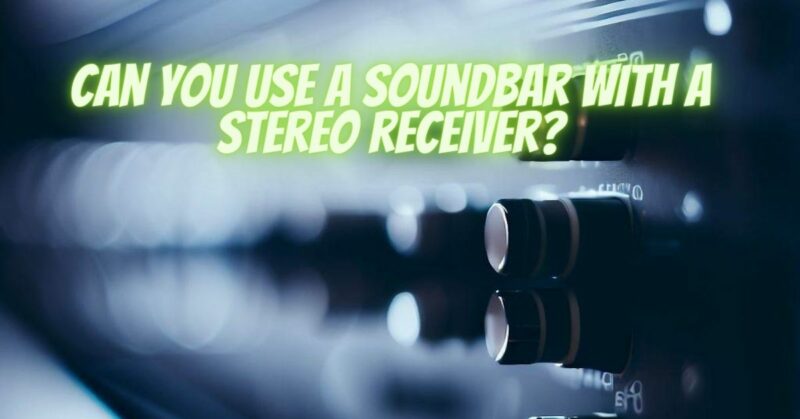Soundbars have gained popularity as a convenient and space-saving audio solution for enhancing TV sound. However, if you already have a stereo receiver as part of your audio setup, you may wonder if it’s possible to use a soundbar alongside it. In this article, we will explore the feasibility of integrating a soundbar with a stereo receiver and discuss the considerations involved.
- Compatibility and Connection Options:
The ability to connect a soundbar to a stereo receiver largely depends on the available connection options and compatibility between the two devices. Most soundbars feature various input options, such as HDMI, optical, and analog connections. On the other hand, stereo receivers typically offer audio output connections, including RCA or speaker wire terminals. To use a soundbar with a stereo receiver, you would need to ensure that the soundbar and receiver have compatible input and output options. For example, if your receiver has an optical audio output, you can connect it to the optical input of the soundbar.
- Soundbar as a Speaker:
One approach to using a soundbar with a stereo receiver is to treat the soundbar as a standalone speaker. In this setup, you would connect the audio output from the receiver to the soundbar, essentially using it as an external speaker. The soundbar would reproduce the audio signal received from the receiver, providing an enhanced audio experience compared to the TV’s built-in speakers. This arrangement allows you to leverage the amplification capabilities of the stereo receiver while benefiting from the soundbar’s design and sound processing features.
- Soundbar as a Preamp/Processor:
Alternatively, if your soundbar incorporates advanced audio processing and decoding capabilities, you may utilize it as a preamplifier or audio processor. In this scenario, you would connect the audio sources directly to the soundbar and then route the soundbar’s audio output to the stereo receiver. The soundbar would handle the decoding of surround sound formats and audio processing, while the stereo receiver focuses on amplification. This setup allows you to combine the soundbar’s audio processing features with the power and performance of the stereo receiver, creating a comprehensive audio system.
- Limitations and Considerations:
When integrating a soundbar with a stereo receiver, it’s important to be aware of certain limitations. Soundbars are designed primarily for TV audio enhancement and may not offer the same level of audio performance as dedicated speakers connected to a stereo receiver. Additionally, compatibility between the soundbar and receiver regarding audio formats, synchronization, and volume control may vary. It’s crucial to check the specifications and features of both devices to ensure they work harmoniously together.
- Personal Preference and Use Case:
Ultimately, the decision to use a soundbar with a stereo receiver depends on personal preference and the desired audio setup. If you prioritize simplicity, space-saving, and convenience, using a soundbar alongside a stereo receiver can offer an integrated audio solution. However, if you seek a more comprehensive and customizable audio experience, separate speakers connected directly to the stereo receiver may be a preferable option.
Conclusion:
While integrating a soundbar with a stereo receiver requires careful consideration of compatibility and connection options, it is possible to combine the two for an enhanced audio experience. Whether you treat the soundbar as a standalone speaker or utilize it as a preamp/processor, the integration can provide improved audio quality and functionality. Evaluate your specific audio needs, compatibility requirements, and desired features to determine the best approach for incorporating a soundbar into your existing stereo receiver setup.

